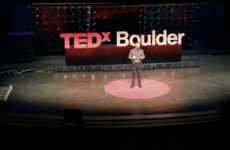
Need Inspiration?
Get inspired by 4,000+ keynote speaker videos & our founder, a top keynote speaker on innovation.
Andrew Forrest's Talk Discusses an Economic Solution to Plastic
Grace Mahas — October 17, 2019 — Keynote Trends
References: noplasticwaste.org & ted
Entrepreneur Andrew Forrest -- one of the top ten richest Australians and the former CEO of Fortescue Metals -- confronts the plastic problem and how humanity's misuse of it is leading to stability for the economy and destruction for the environment. It's widely known that only a small percentage of plastic actually gets recycled and the vast majority of it ends up in rivers, and eventually our oceans -- harming marine life and destroying our ecosystem.
The harm to our ecosystem is obvious -- the deaths of wildlife we see from animals that have become trapped in plastic or who ingest it in place of food never being able to digest it. In addition to the obvious harm plastic causes, when it enters our waterways it never disappears, it simply fragments into micro-plastic that is consumed by wildlife and humanity alike. These tiny particles contain a negative ion, which, when consumed, will eventually enter our skin and organs -- including the brain. This negative charge can carry pathogens and toxins into our system causing serious harm to all.
The public health crisis plastic is creating underscores the urgency of ending single-use plastic, which Andrew Forrest proposes a solution for -- the intensified use of "rag pickers." Rag pickers are individuals, many times children, who live in extreme poverty and seek out plastic waste to collect in exchange for money. This type of labor has drastically decreased after China refused to accept further waste which drove down the price of plastic and made this type of work virtually unprofitable. However, Andrew Forrest does not blame China for the problem of plastic, but rather petrochemical plants who profit from the use of single-use plastic. To underscore this fact, Forrest states that creating new plastic is less costly than recycling old plastic -- meaning its' cheaper for consumers to purchase new plastic over recycled plastic.
To solve this, Forrest suggests raising the price of new plastic by a small percentage in order to raise the price of plastic globally. This would make plastic "an article of value" helping to give rag workers a tangible incentive to find discarded plastic. By the same token, the money made from the additional cost of new plastic can be channeled into an environment and transition fund. This will allow the entire petrochemical industry to transition from creating plastic from new materials to create plastic from recycled materials without losing profit -- ensuring an economic return while aiding the environment. Individuals can help encourage corporations to abide by this recycled plastic solution by visiting www.noplasticwaste.org.
The harm to our ecosystem is obvious -- the deaths of wildlife we see from animals that have become trapped in plastic or who ingest it in place of food never being able to digest it. In addition to the obvious harm plastic causes, when it enters our waterways it never disappears, it simply fragments into micro-plastic that is consumed by wildlife and humanity alike. These tiny particles contain a negative ion, which, when consumed, will eventually enter our skin and organs -- including the brain. This negative charge can carry pathogens and toxins into our system causing serious harm to all.
The public health crisis plastic is creating underscores the urgency of ending single-use plastic, which Andrew Forrest proposes a solution for -- the intensified use of "rag pickers." Rag pickers are individuals, many times children, who live in extreme poverty and seek out plastic waste to collect in exchange for money. This type of labor has drastically decreased after China refused to accept further waste which drove down the price of plastic and made this type of work virtually unprofitable. However, Andrew Forrest does not blame China for the problem of plastic, but rather petrochemical plants who profit from the use of single-use plastic. To underscore this fact, Forrest states that creating new plastic is less costly than recycling old plastic -- meaning its' cheaper for consumers to purchase new plastic over recycled plastic.
To solve this, Forrest suggests raising the price of new plastic by a small percentage in order to raise the price of plastic globally. This would make plastic "an article of value" helping to give rag workers a tangible incentive to find discarded plastic. By the same token, the money made from the additional cost of new plastic can be channeled into an environment and transition fund. This will allow the entire petrochemical industry to transition from creating plastic from new materials to create plastic from recycled materials without losing profit -- ensuring an economic return while aiding the environment. Individuals can help encourage corporations to abide by this recycled plastic solution by visiting www.noplasticwaste.org.
5.5
Score
Popularity
Activity
Freshness

















